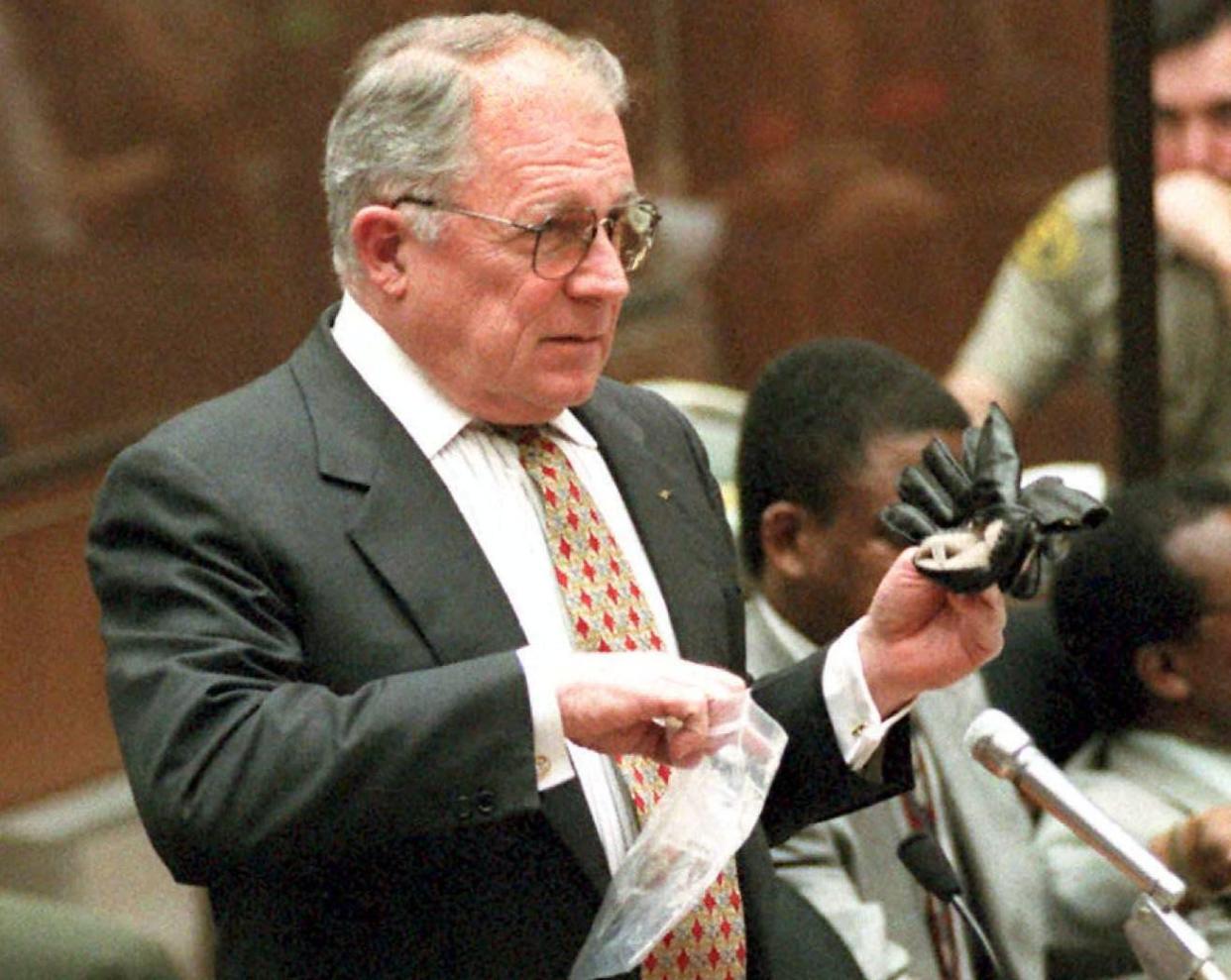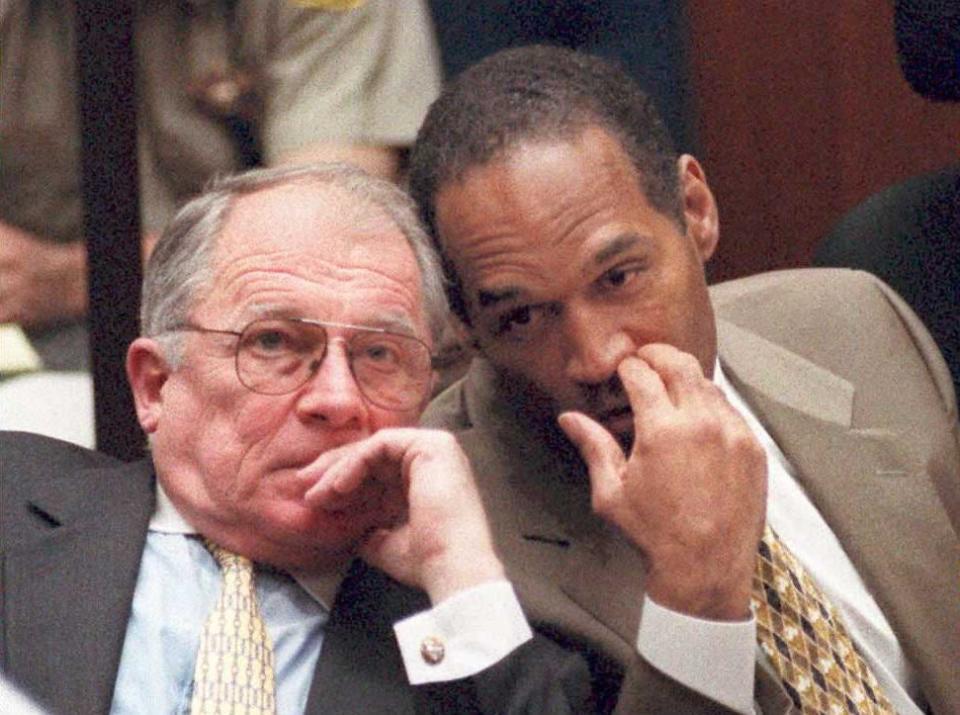F Lee Bailey: Criminal defence lawyer who defended OJ Simpson

- Oops!Something went wrong.Please try again later.
- Oops!Something went wrong.Please try again later.
- Oops!Something went wrong.Please try again later.
F Lee Bailey was the showman-like criminal defence lawyer whose roster of celebrity clients included OJ Simpson and Patty Hearst. Bailey, who has died aged 87, could have continued his successful career and retired in wealth and fame, had it not been for an unwise error that ultimately brought him ignominy.
Francis Lee Bailey Junior was born in Waltham, Massachusetts, in 1933 to Grace, a teacher, and Francis Lee Senior, a salesman. He was educated at Cardigan Mountain School and Kimball Union Academy, graduating in 1950.
Following service with the US navy and the marines, he was admitted to Boston University School of Law in 1957. Bailey was a brilliant student, achieving record high marks and graduating with a First three years later.
His first notable case was that of Sam Sheppard, who in 1954 had been found guilty and jailed for the murder of his wife, Marilyn. During the appeal case at the Supreme Court in 1966, Bailey maintained that Sheppard had not received a fair trial. Following a subsequent retrial, Sheppard was found innocent, winning him his freedom and boosting Bailey’s reputation.
In 1971, Bailey defended Captain Ernest Medina of the US army, who faced a court-martial trial for allowing his men to kill civilians during the My Lai Massacre in Vietnam. Bailey successfully argued that Medina could not be held responsible for the independent actions of the soldiers beneath him, who had carried out the killings of their own volition. He was found not guilty of all charges.
However, not all his cases resulted in success for Bailey and his team. The newspaper heiress, Patty Hearst, was kidnapped in 1974 while a student at Berkeley and had carried out armed bank robberies as a prisoner and member of the Symbionese Liberation Army (SLA), her captors.
Arguing that Hearst was a victim of Stockholm Syndrome – where a hostage shows loyalty to their abductor – Bailey attempted to show that her actions were the result of psychological manipulation by the SLA’s leaders.
But the jury disagreed and Hearst was convicted for bank robbery and the use of a firearm, receiving a seven-year jail term. In sentencing her, Judge William H Orrick Jr said “...rebellious young people who, for whatever reason become revolutionaries, and voluntarily commit criminal acts will be punished”. Hearst was released in 1979, when her sentence was commuted by president Jimmy Carter, and she was later pardoned by president Bill Clinton.

In 1994, OJ Simpson was arrested and accused of the murders of his former wife Nicole Brown and her friend, Ron Goodman. At the high-profile “trial of the century” the following year, Simpson invited Bailey to defend him as part of a “Dream Team” of lawyers led by Johnnie Cochran.
The team alleged that DNA evidence relating to the case was unreliable and focused their attention on a “bloody glove” discovered at Simpson’s home in Rockingham. Bailey suggested that detective Mark Fuhrman had planted the glove to frame Simpson. Throughout the trial, recordings were produced by Simpson’s defence team to demonstrate that Fuhrman had used racist language in discussions about African Americans in the past. “That was the day Fuhrman dug his own grave”, Bailey later recalled.
Following an 11-month-long trial, the jury arrived at their decision on 2 October 1995 and the “not guilty” verdict was released the following day, watched by an estimated 100 million people worldwide. Simpson was freed after 473 days in custody. Bailey retold the story of his best-known case in the book The Truth about the OJ Simpson Trial: By the Architect of the Defense.
While the Simpson trial was going on in Los Angeles, Bailey’s fall from grace began on the East Coast, in Florida, with his defence of Claude Duboc, a cannabis dealer. Duboc had transferred $5.3m (£3.7m) worth of shares in a Canadian pharmaceutical company to Bailey for safekeeping. However, when the US government sought to seize all of Duboc’s assets, Bailey refused to give up the stock. He argued that he should be entitled to keep the difference in value between when he received the shares and when he was asked to surrender them, by then worth $27m.
Bailey was jailed for contempt of court. Although released after just 44 days, he spent the next two decades in dispute with the US Internal Revenue Service over the proceeds of DuBoc’s stockholding.
The Florida Supreme Court disbarred him, and he tried to reestablish his attorney business in Massachusetts before setting up a legal consulting firm in Maine. The star lawyer was made bankrupt in 2016 over unpaid taxes, and his career ended in ignominy.
He was married four times, having two sons from his first marriage to Florence Gott and another son from his second marriage to Froma Portley.
F Lee Bailey, lawyer, born 10 June 1933, died 3 June 2021
Read More
Jacob Stein: Watergate lawyer who represented Monica Lewinsky following Bill Clinton affair
Allan Gerson: Lawyer who sought justice for Lockerbie victims

